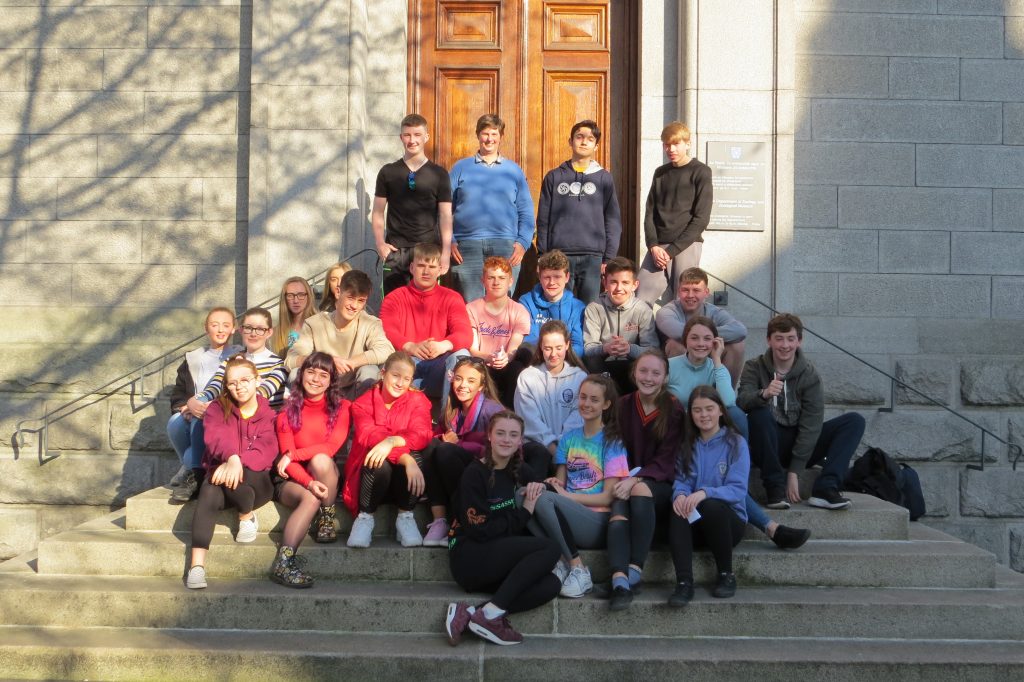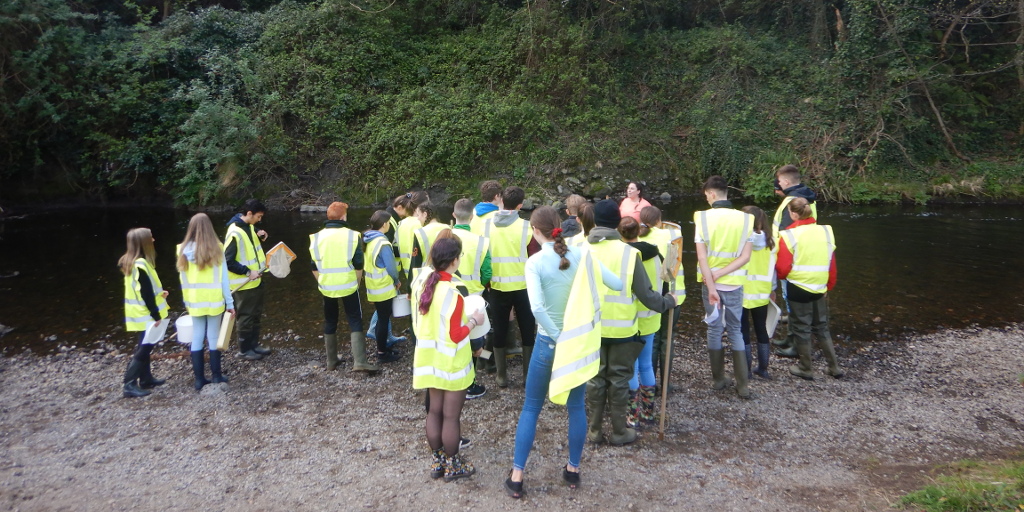Zoology TY week is a programme of events put on for 24 transition year (4th year) students per year, drawn from schools across Ireland. Gaining a place is a competitive process, with 90 or so applications in each year so far. The winners get to experience what it’s like to be a zoology undergraduate, participating in workshops, practicals, lectures and discussions, with a tree walk, a bird race and a mini-field trip thrown in. They get hands-on experience and also the opportunity to discuss the life of a zoologist with undergraduates, post-graduates and teaching staff. The sessions are designed to show the breadth of the subject, ranging from consideration of tiny biology like the genetic analysis of what makes an embryo grow correctly, through individual animals in their parasitology, marine and terrestrial biology, and behaviour, up to the entire system in ecology and evolutionary biology. They are taught by the same lecturers as teach our undergraduates, so the TY class get to know their future teachers too. The following blog consists of paragraphs written by the Zoology TY class of 2019, half way through their week.
Applications for next year’s TY week will open in November – look for an application form on the TCD Zoology website then!
I’m currently mid-way through my week here in Trinity on a Zoology course. It’s been an exciting and action-packed 3 days so far and it’s safe to say I’m not excited for it to be over. My favourite activity so far would definitely be in one of the new labs learning about mammals and the different ways in which to find mammals, catch them, and retrieve samples. We then were told that owls swallow their food whole, grind up the meal in their stomachs, digest the nutritious part of the meal, and then they cough up the remaining fur, bones etc. in the form of a pellet. Everyone was given a pellet to break up and inspect the bones under a microscope to determine what small mammal the owl had fed on. This was probably one of the most fascinating experiments I’d done as it was up close and magnified. It’s incredible to think about the functions of tiny animals, and I’ll definitely never be able to look at a field mouse the same again!
Oda Carty
A new aspect of my experience was the bird race. When I first heard about the race, I took it quite literally as birds racing, but, in truth, it involved bird watching. This proved to be an interesting experience due to the amount of birds that live on the Trinity campus, but in a (semi-)competitive setting. It also gave me a chance to observe more of the college than I would usually see.
One thing that I’ve really enjoyed from the Trinity TY Zoology week was a lecture with Martyn Linnie – “Murder, Mystery and Maggots: Crime Scene Insects”. Martyn began the lecture by giving some general information on insects, such as that they are a source of food and commercial products, as well as being pollinators. Martyn then began talking about forensic entomology once he was certain that he had our attention. I was surprised by how interested I was, as I was never really one for insects. He told us about how different insects arrive at different times and how this can be used as a “clock” to find the time of death. He also talked about different cases that he’s worked on himself as a forensic entomologist. His lecture was extremely interesting and made me realise just how much I actually enjoy forensic entomology. I’m very grateful that I was given the opportunity to come to this course.
Chloe Keane

We are taking part in a week-long Zoology course. During the week the most intriguing part was the Tree Walk. We initiated the experience by being introduced to Ruth Kelly. We set off on our breath-taking expedition at Trinity College. We discovered a bee hotel on the trunk of a tree, which is home to the indigenous bees of Ireland. We then went along and came across Cherry Blossom trees and learned how to tell a cherry from a Crab Apple Tree by their bark. We came across two stumps and learned how the drought during the summer has damaged trees and dried them out, causing them to be weakened and more vulnerable to falling over. In conclusion, the wide variation of trees in Trinity College all have their own unique history and the tour was very fascinating.
Phoebe Fogarty, Sarah Fleming, Andrew Matthews
We found the vulture class the most interesting class so far. We learned how a zoologist works to help an endangered species, from the perspective of a zoologist themselves. We learned how they can use computer programs and maths to test how the decline of populations in a species can affect their future. We also learned about the impact an animal going extinct can have on the surrounding area and ecosystem. It can lead to more disease and the decline of other animal populations.
Louis Grelet, Fionn O’Connell
I have found this week incredibly interesting. From day one I was hooked. We were given a tour of the museum in the Department of Zoology. I really enjoyed learning about all the animals in the past; the combination of history and biology was the perfect introduction to the course. I enjoyed learning about the Great Auk – the story behind the Auk’s extinction is tragic and upsetting. However, I believe that the story of how an amazing animal can become extinct due to human activity, is one that we’re experiencing today. I found it really eye-opening that humans, no matter how advanced and intelligent we are, don’t learn from previous mistakes, and are repeating them. I will be back to the museum over the summer to learn more stories, and learn the importance of not repeating mistakes.
Olivia
When I first arrived at the course, I had no idea what to expect. I was thinking of pigeon races and investigating shark attacks. But from the moment I started this course I was so interested in everything we did. From talks about vultures and tree walks to learning about periwinkles and seaweed, the zoology field is so broad. You can start in zoology and have qualifications and skills that apply to so many other professions. I got to talk to zoology students and learn about the practical side of zoology. The students got to go to Kenya and told me about all of the places zoology has taken them. My favourite part of the week had to be the bird race. We ran around the campus like crazy people, trying to find as many species of bird as we could. One of the bonuses of the race was the prizes. 🙂 My team won and were rewarded with a huge bag of celebrations. Go team Fionn!! The Trinity campus is so beautiful and it’s so nice to have a job that’s so mentally stimulating and gets you out learning about your environment, not just sitting in an office all day. If you’re an outdoorsy-type person or even a person who likes to work with data and numbers, zoology is definitely for you. When you love what you do, it’s not work, and this week is the perfect opportunity to find out if Zoology is for you or not.
Éala McDermott
From the time I’ve spent in Trinity College so far, I feel I have learned a lot. As a person with hopes of working in the world of science in the future, I would recommend this course greatly. I think it’s a great experience and is a week jam-packed with fun activities. One of the most interesting and beneficial ones for me so far would have to be the talks given to us by past Zoology students. The reason I found these talks the most fascinating was because I could relate to them. Unlike in school, the speakers gave first-hand information to us, coming straight from the source. I feel much more educated on how to get to where I want to be and how I can achieve my future goals. I now know the different options and paths I can take in the area of Zoology. I’m so glad I signed up for this course. It has been eye-opening.
Ciara Walsh
More outreach events in the Department of Zoology:
- Science Communication Opportunities – by Maureen Williams 20/11/2018
- From Worms to Wildfire: Natural Sciences at PROBE 2018 – by Gwendoline Deslyper and Cian White 05/10/2018
- Lightning Strikes at TCD – by Andrew Mooney 08/11/2017
- Winning research – Zoology storms the Lightning Talks – by Rachel Byrne 23/11/2016

